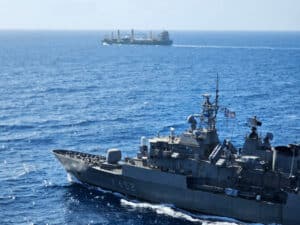
AMP Chairman responds to Jones Act critic
Written by Marine Log Staff
OCTOBER 8, 2014—When it comes to U.S. domestic shipping policy, the Jones Act inevitably is one of the first things to come up in the discussion.
With U.S. crude oil production booming—it is up 50 percent since 2008 and up about 1 million barrels per day since April 2013—the demand for Jones Act product tankers, Articulated Tug Barge (ATB) units and inland tank barges has grown. There are currently 16 product tankers, one crude carrier, and 11 ocean tank barges on order or under construction at U.S. shipyards.
Speaking to delegates at the Trade Winds Jones Act Forum, Tom Allegretti, Chairman of the American Maritime Partnership (AMP), said, “The domestic maritime industry, with the Jones Act as its statutory foundation, is investing heavily to meet the transportation demands of a booming energy economy. We are witnessing a new era of domestic vessel construction that is adding nearly 16 million barrels of inland and oceangoing tank vessel capacity. The Jones Act provides the certainty American companies need to commit the capital that makes this construction, and the jobs that go with it, a reality.”
AMP is a Washington, DC, lobbying arm for U.S. maritime industry.
Allegretti said, “American maritime also remains critical to protecting U.S. national and homeland security, with American mariners serving as eyes and ears on our inland waterways and coastlines. Given the value American maritime brings to our country, it’s not surprising that the Jones Act has consistently maintained solid bipartisan support from Congress, from the Administration, and from our nation’s military leaders.”
Allegretti also responded to comments by Charles Drevna, President of the American Fuel and Petrochemical Manufacturers (AFPM), Washington, DC, who proposed using foreign-flag tankers to move U.S. domestic crude oil and petrochemical products. Such action would “undermine America’s national, economic and homeland security,” Allegretti said.
Allegretti said, “Comparing domestic shipping rates to foreign shipping rates is comparing apples to oranges. American companies are subject to different, more expensive and extensive laws than foreign shipping companies. Once you start adding in the cost of complying with U.S. regulations like wage and hour laws, immigration laws, and tax laws, suddenly the cost differential between U.S. and foreign vessels starts to disappear,” said Allegretti.
“Further, the average cost of a gallon of gasoline at the pump attributable to use of a Jones Act vessel is one cent or less per gallon,” Allegretti continued. “That makes it all the more perplexing why some would propose changes that undermine America’s national, homeland and economic security for such minor savings.”
“At a time when we see one negative news story after another, it’s nice to have some good news to reflect on —the news of America’s domestic maritime renaissance and the high-quality jobs it provides for American citizens.”





Leave a Reply
You must be logged in to post a comment.